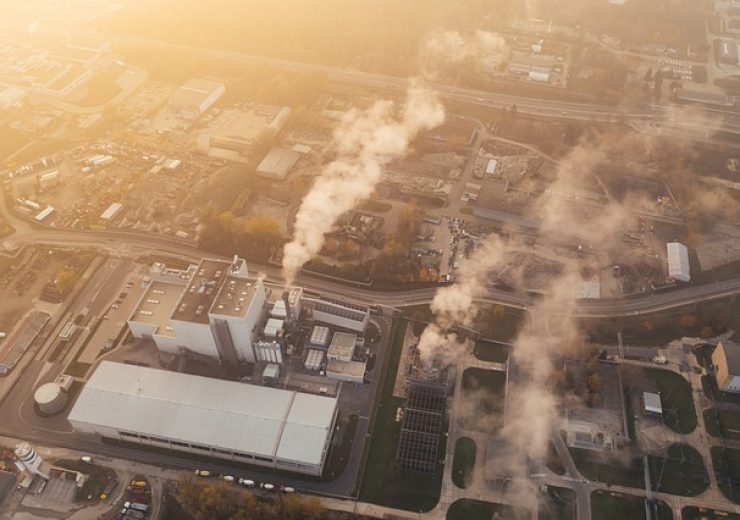Polaris would have storage capacity of about 300 million tonnes of CO2 over the life of the project

Shell proposes large-scale CCS facility in Alberta. (Credit: marcinjozwiak from Pixabay)
Shell announced a proposal to build a large-scale carbon capture and storage (CCS) project at its Scotford Complex near Edmonton. This would be a key step in transforming Scotford into one of five energy and chemicals parks for Shell around the world, providing customers with lower-carbon fuels and products into the future, such as hydrogen.
The proposed Polaris CCS project, the largest in a series of low-carbon opportunities Shell is exploring at Scotford, would capture carbon dioxide (CO2) from the Shell-owned Scotford refinery and chemicals plant. The initial phase is expected to start operations around the middle of the decade, subject to a final investment decision by Shell expected in 2023. Polaris would have storage capacity of about 300 million tonnes of CO2 over the life of the project.
“Shell is making bold moves to decarbonize our operations, and wider industry, and the Polaris CCS project is the latest example,” said Susannah Pierce, Shell Canada President and Country Chair. “Our plans for Scotford are in line with Shell’s target to become a net-zero emissions energy business by 2050, in step with society. We are creating a world-class site that will provide customers with lower-carbon fuels, products and CO2 storage. Polaris would also make a significant contribution to Shell’s aim to have access to an additional 25 million tonnes a year of CCS capacity by 2035.”
The Polaris CCS project follows the success of the Quest CCS facility at Scotford, which has captured and safely stored more than six million tonnes of CO2 in its six years of operation. Recently, Shell has also taken a final investment decision on the Northern Lights CCS project in Norway and is part of the Porthos CCS project in the Netherlands.
“Our government is committed to developing carbon capture, utilization and storage (CCUS) to help reduce emissions and capitalize on emerging economic opportunities,” said Sonya Savage, Alberta Minister of Energy. “Projects like Shell’s Polaris CCS show that Alberta is open for business and our oil and gas industry confidently looks to be a global player in a low-carbon future.”
The initial phase of the Polaris CCS project would capture and store approximately 750,000 tonnes a year of CO2 from the Scotford refinery and chemicals plant. It would reduce Shell’s direct and indirect emissions (Scopes 1 and 2) by up to 40% from the refinery and by up to 30% from the chemicals plant. It would also create up to 2,000 jobs.
The second phase of the Polaris CCS project involves the creation of a CO2 storage hub in Alberta, further decarbonizing Shell’s facilities and storing emissions on behalf of third-party industry sources as a trusted and reliable CO2 storage operator. Fully built, and contingent on acquiring pore space leases from the Province of Alberta, Polaris could serve as a CO2 storage hub for more than10 million tonnes of CO2 each year.
Once fully built, Polaris would contribute to the Edmonton region becoming Canada’s first hydrogen hub. In the initial phase of Polaris, CO2 captured from the refinery’s hydrogen plants would produce blue hydrogen for use in the refining process, with the potential for large-scale blue hydrogen production in future phases. Shell is also exploring the development of additional volumes of blue and green hydrogen at Scotford that leverage Alberta’s abundance of natural gas and availability of renewable sources of power.
The transformation of Scotford into an energy and chemicals park for Shell builds on the site’s leading positions in energy efficiency and CCS, while including renewable sources of power and bio-feedstocks. CCS and renewable power will allow Scotford to process new feedstocks such as bio-oils or waste oils to significantly reduce the CO2 emitted in the production of the fuels of today. Scotford’s transition into a fully integrated energy and chemicals park is anticipated to happen this decade.
Rod Frank, Mayor, Strathcona County: “Strathcona County is proud to be the home of Shell Scotford, one of Shell’s five global energy and chemicals parks. The announced Polaris CCS project, located within Alberta’s Industrial Heartland, aligns with Strathcona County’s Strategic Plan, delivering economic development and environmental sustainability simultaneously. Polaris CCS will create new jobs, support our local economy, enhance business certainty, investment attractiveness, and aid in recovery from COVID-19. It will also reduce carbon emissions and move our region closer to becoming North America’s Hydrogen Hub, the fuel of the future.”
Beth (Hardy) Valiaho, Vice President Strategy and Stakeholder Relations of the International CCS Knowledge Centre: “We applaud this announcement by Shell Canada. It builds on their expertise in CCS from both the Quest project and the capture technology at Boundary Dam 3 CCS facility. Through the Polaris CCS project and its potential to be a world-class CO2 storage hub, we see, once again, the leadership of Shell Canada in large-scale CCS as a means to reduce carbon emissions and ensure responsible and sustainable energy.”
Source: Company Press Release
